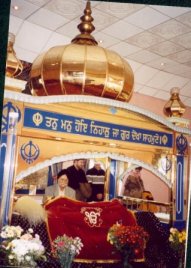

John Newton has been called 'the most unclerical person to take holy orders' (Reeves and Worsley, Favourite Hymns,2001).
We remember him today for two reasons - for the collection of Olney Hymns which he wrote with the poet William Cowper, and for the help that he gave to William Wilberforce (1759-1833), the campaigner against the slave trade.
Newton wrote the hymn,'Great shepherd of thy people, hear', which appears amongst these pages.
Newton was the son of a commander in the merchant service. As a boy of eleven he joined his father at sea and by the age of 18 he was a midshipman on HMS Harwich. He then joined the crew of a ship that was engaged in the slave trade.
He worked for, and was ill-treated by, a planter on the west coast of Africa. His father was so anxious about him that he asked seamen to look out for him and he was rescued and brought back to England. On 10 March 1748 he was steering the ship on the homeward voyage through a great storm. He regarded that experience of grave danger as the beginning of his desire to serve God.
English people in the 18 century regarded slave trading very differently from the way we do today. Newton continued to serve on slave ships until 1754. Then he became Surveyor of the Tides at Liverpool. Patient years of study led him to become a clergyman and he became the curate of Olney in Buckinghamshire in 1764.
Here he became friendly with William Cowper and it was Cowper who inspired him to write hymns for his own congregation. Among the many hymns Newton wrote is 'Amazing Grace'.
Cowper wrote hymns too, one of the best known is 'O for a closer walk with God'.
Newton moved to the living of St Mary Woolnoth, in London, in 1780. He got to know William Wilberforce and was able to provide him with a good deal of factual information about the slave trade to support his campaign against it.
Amazing Grace - The story of John Newton
Find out more about John Newton